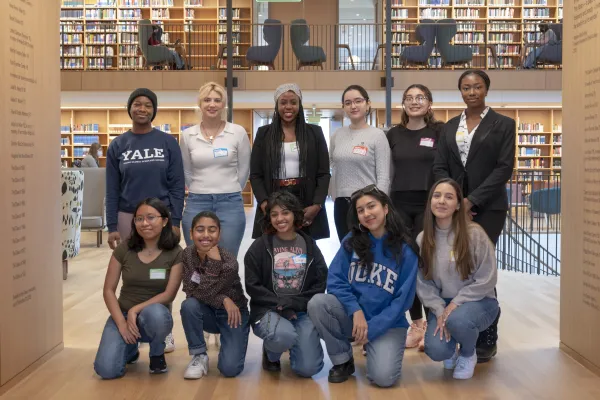Becoming ‘Money Mentors’
Research & Inquiry
A new financial literacy program at Smith trains students to coach their peers

Published March 30, 2023
Izzy Quiñonez ’26 used to view financial planning as an activity reserved for older people—those at a different stage of life.
But a new financial literacy program sponsored by Smith’s Jill Ker Conway Innovation and Entrepreneurship Center has shifted her thinking.
“I feel like it’s helped me shape my financial goals,” says Quiñonez, who is one of 10 students participating in the Financial Literacy Empowerment Fellows program that launched earlier this year. “These are important skills for people our age to have."
Quiñonez decided to apply to the program after a friend invited her to attend one of the Conway Center’s “Demystifying Money” sessions last fall.
“I came for the moral support and stayed for the financial literacy,” she says, with a smile.
“I’m a low-income student and never really learned about these sorts of things. I now realize I’m not the only one who doesn’t know a ton about handling money.”
Supported by a grant from the Hearst Foundations, the fellowship program is designed to educate students about personal finances and investing, and train them to become “money mentors” to their peers.
“This spring, students are going through boot camp training and coaching sessions with each other,” says René Heavlow, director of operations and special programs for the Conway Center. “Next year, those students will be coaches to others on campus. They’ll be spreading the wealth, so to speak.”
Heavlow says Smith’s program is unique in higher education. “Most places using the peer coaching model for financial literacy have a finance program or a business school,” she notes. “I’ve not seen a similar program at a liberal arts institution such as ours.”
The empowerment program—which is aimed at students from historically underrepresented groups—will make use of Smith resources, including the Lazarus Center for Career Development and Project Coach.
Faculty members will serve as advisers to the fellows, and Sabrina Antoine Correia ’11—who started her own leadership and financial education business, STC Coaching—is leading this semester’s training sessions.
Correia, who majored in economics at Smith, says the core of that training is about values.
“When we talk about finances, people automatically think about money and numbers,” she says. “But I tell them that 80 percent of finance is behavior. We have to start with a conversation about who we are and how we show up. How do these life skills intersect with our values?”
In a recent training session, students explored the topic of credit—how it works, how it can be managed, and what impact a credit score has on individual finances.
“You often hear people talk about credit scores as if they describe who you are as a person,” Correia told the group. “The score doesn’t define who you are. But it is attached to life goals that have financial implications.”
She described some strategies for achieving—and maintaining—good credit scores, such as paying more than the monthly minimum balance due on a credit card.
“What happens if you stop using a card?” one student wanted to know.
“Read the fine print,” Correia warned. “A card that is inactive may have a penalty that will affect your score.”
Engineering major Dianne Hernandez ’24 says such practical tips are one of the best things about the financial literacy training, so far.
She, too, has come to see such training as essential for herself and fellow students. “I had felt I was too young to be thinking about financial topics such as investing and retirement plans, but that’s not the case,” Hernandez says. “You’re never too young if these financial matters are important to you.”
Gaining a better understanding of budgeting and finance will also help her reach her goal of becoming a chemical/materials engineer, Hernandez says.
“Cost efficiency is a very important topic in engineering,” she notes. “What I’m learning in this program will help me plan out solutions to questions such as ‘if I were to scale up this project, how much would it cost and how would that affect the efficiency?’”
As for becoming a mentor to her peers, “There are many students who feel like they are not in control of their own finances for legitimate reasons,” Hernandez says. “I’m looking forward to listening and helping others to organize their thoughts, plans and next steps so they can achieve their financial goals on their own.”
The first group of Smith Financial Literacy Empowerment Fellows and their trainer (top row, third from left) Sabrina Antoine Correia ’11